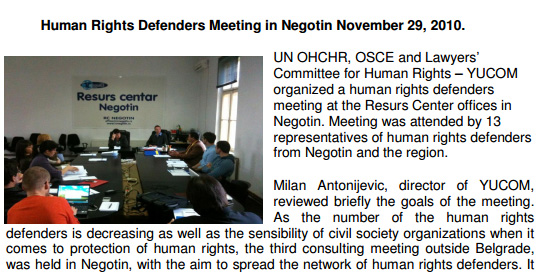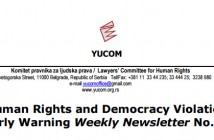Ruzica Banda, Human Rights Officer at OSCE Mission to Serbia, reminded that OSCE recognizes protection and respect of human rights as the core issue of security, therefore it acknowledges the need for creating special mechanism for addressing issues of human rights defenders within OSCE, as it was created in 2007, within ODIHR, Warsaw. ODIHR provides support to civil society and to the states – human rights conventions signatories. Recognizing the importance of civil society and human rights defenders, in 2007 OSCE appointed contact person to independent human rights organizations for implementation monitoring by the signatory States, in addition, the contact person is the focal contact point in cases of serious violations of rights of HRDs.
Participating HRDs presented concrete problems they face on a daily basis.
Attacks and pressures: HRDs and human rights organizations come under a lot of pressure for their work. Premises of the organizations are often being attacked by individuals. Although the attacks had been published in the media, and recorded videos of the attacks sent to the police, the executors have not yet been arrested.
It is stated that the office of the public prosecutor often prosecutes HRDs on arbitrary basis. In addition, it was stated that state authorities do not conduct adequate investigations in order to identify aggressors on HRDs. As stated, HRDs are often subject to various inspections and informative conversations by the office of State prosecutor and the Security Information Agency.
Attacks are often being ignored by some media and untruthful stories are being reported on HRDs’ activities. In that way the media support a creation of bad image of HRDs.
Decreasing of number of the human rights organizations and increasing number of human rights violations is evident.
Participating HRDs stated that although they have a good cooperation with the Commissioner for Information of Public Importance and the Ombudsman, they are facing clear problems of cooperation with the Ministry of the Interior, State Prosecutor and Ministry of the human and minority rights.
There is a great pressure on the lawyers representing victims of human rights violations. Lawyers are commonly exposed to tremendous pressure and threats.
There have been cases of discouraging the lawyers by the office of state prosecutor with the advice they should mind their own business.
Finances: Participating HRDs stated that, even when there are available funds assigned for their activities, the importance of the organizations with the long experience in human rights protection is undermined. In addition, the State did not determine clear criteria based on which representative of the NGO sector is being elected at the committee which decides upon distribution of funds. The sole process of selection of the representative and the distribution of the funds is, as well, insufficiently transparent.
There is a concern that funds are being allocated to organizations which lack adequate capacity and trust among citizens, which consequently leads to constant decrease of number of the active HRDs and with time it can lead to total distinction of the HRDs network. As the result of the lack of financial and institutional support, a great number of NGOs are closing.
Opinions and experiences regarding cooperation with the representatives of local self-government, are divided. One part of HRDs do not have any kind of cooperation while others claim that they do cooperate however, it is not rare that their accounts are blocked by the decision of the local self-government representatives. Participants agree that with a clear support by international organizations would influence state authorities and organs of local self-government.
Education: authority officials, judicial organs and office of the public prosecutor lack adequate training on ratified human rights conventions and generally on human rights, and do not demonstrate necessary sensitivity in cases of breaches of the Constitution and the rights guaranteed by international instruments. General lack of support to the HDRs work is evident, with a tendency toward creation of general negative stereotypes which consequently decreases number of the human rights organizations.
Identified problems refer not only to situation of HRDs but to the state of human rights as well, the problem of synchronizing legal norms and practice with the obligations the state undertook regarding protection and promotion of human rights is evident.
Conclusions from the third consulting meeting of human rights defenders in Negotin:
There is a need for awareness raising and training of the state officials, judicial organs and office of the public prosecutor about the role of HRDs on one side, and bout human rights in general, on the other side.
A clear support by international organizations to the work of HRDs is necessary in order for HRDs to increase their importance before State and local self-government organs.
It is necessary for international organizations to be clearer and more transparent in valuation of the State, regarding execution of the obligations deriving from ratified human rights instruments.





